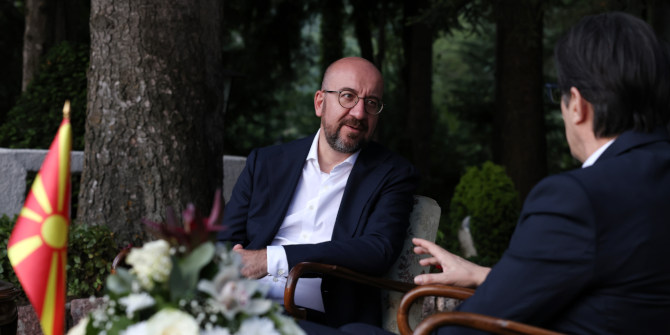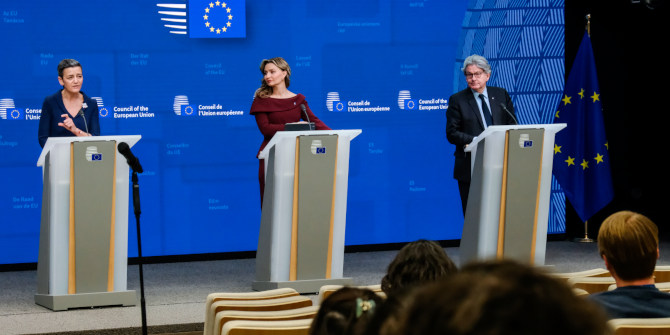 In 2010, EU member states committed themselves to a strategy for establishing greater economic and social integration of the Roma communities living in European countries. Yaron Matras notes that while substantial financial resources have been directed toward the issue, some interventions have had the paradoxical effect of increasing segregation. He writes that cutting this funding and investing in self-assertive capacity building might offer a better alternative.
In 2010, EU member states committed themselves to a strategy for establishing greater economic and social integration of the Roma communities living in European countries. Yaron Matras notes that while substantial financial resources have been directed toward the issue, some interventions have had the paradoxical effect of increasing segregation. He writes that cutting this funding and investing in self-assertive capacity building might offer a better alternative.
Policies of exclusion against Roma go back many centuries – from medieval edicts that banned ‘Gypsies’ from entering cities, through to summary executions and genocide in World War II, via school segregation and enforced sterilisation under Communism and systematic surveillance in the West. More recently there have been wholesale expulsions of EU Roma migrants from France and Italy.
As a recurring justification for persecution, control and containment, Roma are portrayed as a threat both to others and to themselves. The Spanish Inquisition accused Gypsies of sorcery and of attracting local ‘followers’, while Joseph II of Hungary introduced strict supervision to make sure that Roma did not neglect their children’s education. The latest EU Council recommendation on “Effective Roma Integration” is far-reaching in its demands to support Roma, but it also calls for transnational coordination of the mobility of Roma in the EU and for a special effort to tackle issues of safeguarding, trafficking, and forced marriage. The implication is that these issues are particular to Roma and therefore require dedicated policy beyond the existing frameworks that guarantee freedom of movement to EU citizens and protect society’s vulnerable from exploitation.

‘Support through segregation’ has become endemic in policy on Roma. The Council of Europe, once the spearhead of policy drafting on Roma rights, is now a contractor for the European Commission, which bankrolls projects that target Roma. One of the largest is Romed, which offers training and networking for ‘Roma mediators’. The rationale is that Roma require ‘mediation’, rather than simply participation, to access public institutions.
The very concept sets the interaction between Roma and institutions as a potential conflict zone and the Roma as one of the conflicting parties, on a par with the institutions that actively exclude them. The crux of the project is that most Roma participants actually enjoy the networking experience and are grateful for the opportunity, despite the fact that it offers them no job prospects or even proper accreditation. The disturbing philosophy is that Roma trainees should only be equipped to deal with Roma issues and work strictly among their own people.
Since the early 1990s George Soros’s Open Society Foundations (OSF) have offered stipends, grants, and jobs to Roma who had an education and an interest in community work. That model is now followed by the Roma Education Fund and the Decade of Roma Inclusion, where OSF plays a lead role along with other donors. Their contribution to networking and raising awareness has been considerable. Yet they have been criticised for creating a generation of ‘professional Roma’ – hundreds, perhaps thousands of individuals who have little in their portfolio that would equip them to take on lead roles in anything outside the Roma sector itself. With few opportunities to interact with non-Roma colleagues they have no real prospect of challenging stereotypes and eradicating the suspicions that cause exclusion in the first place.
In the UK and elsewhere, tackling the ‘Roma issue’ has become a lucrative business. Voluntary sector agencies are keen to tap into the formidable resource of EU grants dedicated to Roma inclusion. They are backed by local authorities, who want to outsource front-line support to independent organisations so that they can claim credit for success but diminish responsibility and accountability for failures. In order to qualify for grants, organisations need to identify a problem and they need to convince the funders that they have the necessary expertise to solve it. The ‘Roma issue’ becomes self-serving.
Two ‘issues’ are currently at the top of the agenda. The first is education. The arrival of young Roma families from Eastern Europe who have many children and settle in close proximity to one another poses challenges for local schools. Some agencies offer support in the form of segregated ‘hubs’ where young Roma mediators are sometimes deployed. This keeps Roma pupils out of sight and reduces the pressure on teachers. But it also blocks their progress, perpetuating the need for special support and reducing teachers’ aspirations of the Roma – a vicious circle that becomes difficult to break.
The second issue is particularly scary. It capitalises on recent trends to ethnicise concerns over child protection, and on century-old suspicions of Roma as unable to care for themselves. Roma migrants in Italy, Spain and the UK live in panic that their children might be taken into care. Teachers and GPs are being advised to look out for signs of child abuse specifically among the Roma. ‘Roma culture’ is portrayed as a threat to its own people. Claims are made that Roma girls are ‘at risk’ and that there is a disproportionate rate of teenage pregnancy among the Roma.
So-called ‘early marriage’ among the Roma is portrayed as a ‘safeguarding’ priority. Marriage is technically not possible under the age of sixteen and therefore the mere concept of ‘early marriage’ is a contradiction in terms, unless the intention is to contain or even to criminalise teenage relationships just because they occur within the Roma community. But at stake are attractive funding grants for ‘safeguarding’ interventions, and the risk that if they take no action, local authorities might be seen as neglecting their statutory duty of care.
Sadly, energetic young Roma who care for their community are sometimes coerced into complicity with such interventions. They are often reluctant to speak up against the current setup because they do not wish to lose the petty privileges that it offers them: opportunities to network with others of similar backgrounds, hourly paid temporary support jobs at schools, part-time mediation contracts for local authorities, and stipends and grants to run NGOs and culture events.
Cutting the EU funding stream for social interventions on Roma might be harsh but could reduce the incentive to engage in ‘problem management’ and the temptation to portray Roma culture as a threat. Investing more in self-assertive capacity building while at the same time closely scrutinising external support projects would be even better.
Please read our comments policy before commenting.
Note: This article gives the views of the author, and not the position of EUROPP – European Politics and Policy, nor of the London School of Economics.
Shortened URL for this post: http://bit.ly/1pDr1JC
_________________________________
 Yaron Matras – University of Manchester
Yaron Matras – University of Manchester
Yaron Matras is Professor of Linguistics at the University of Manchester and editor of the journal Romani Studies. His most recent book is The Romani Gypsies (Harvard University Press, 2015).





